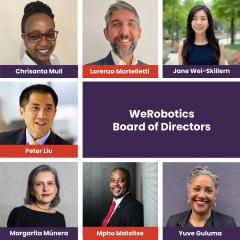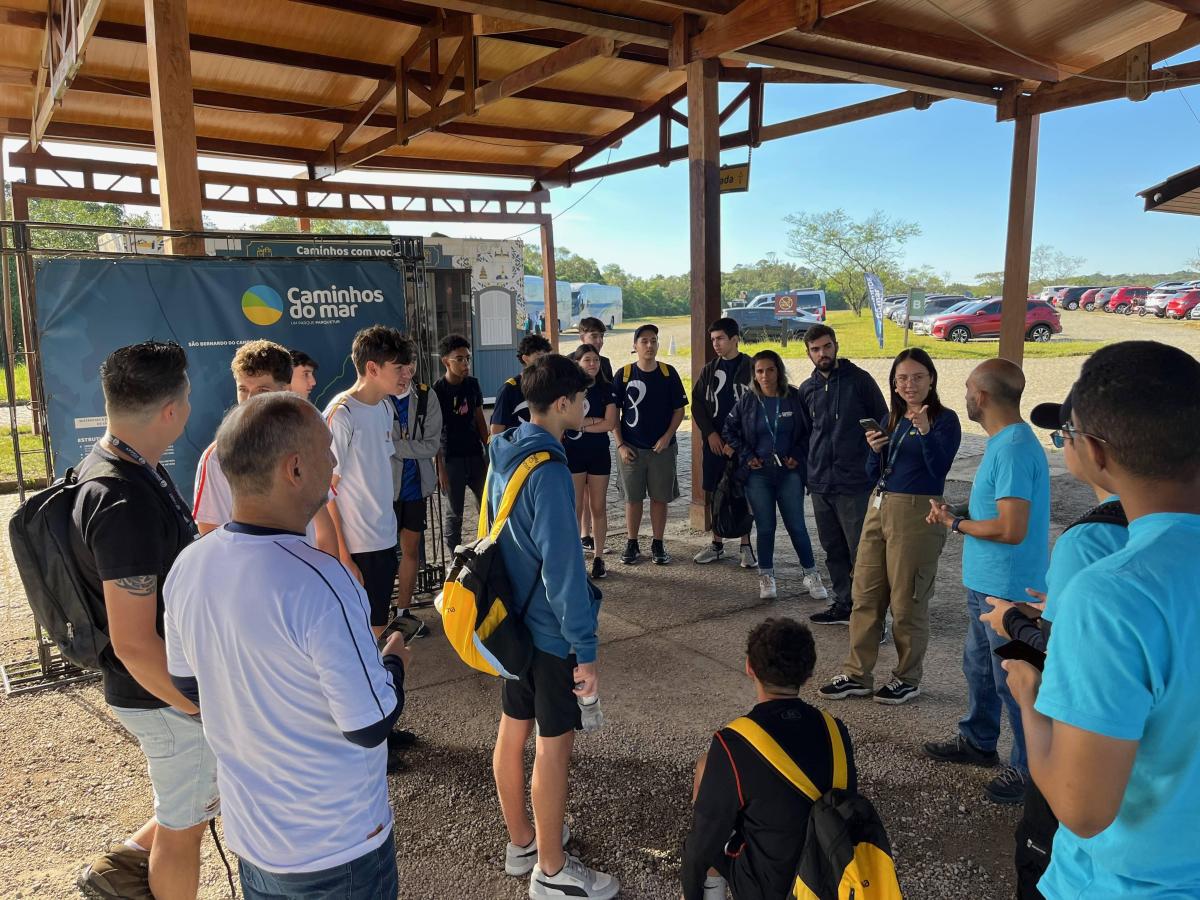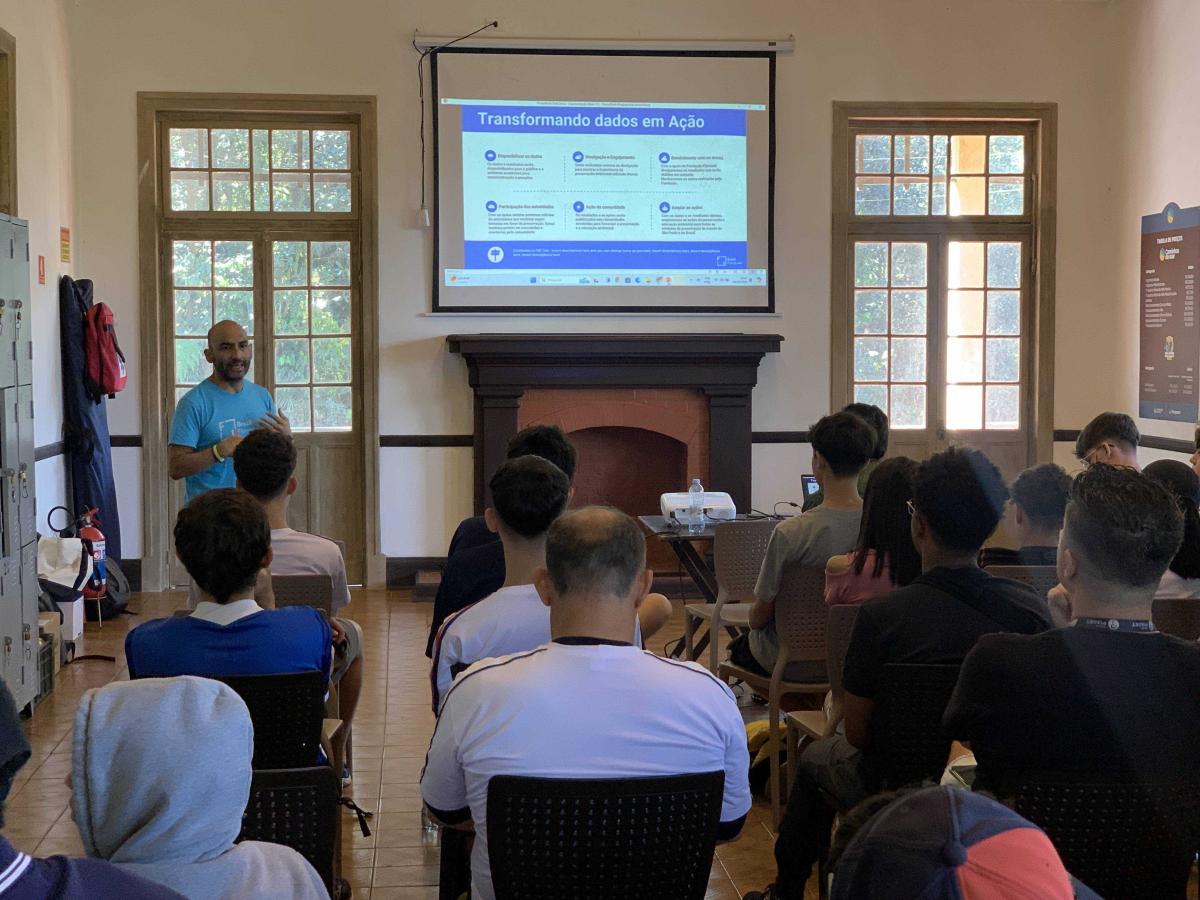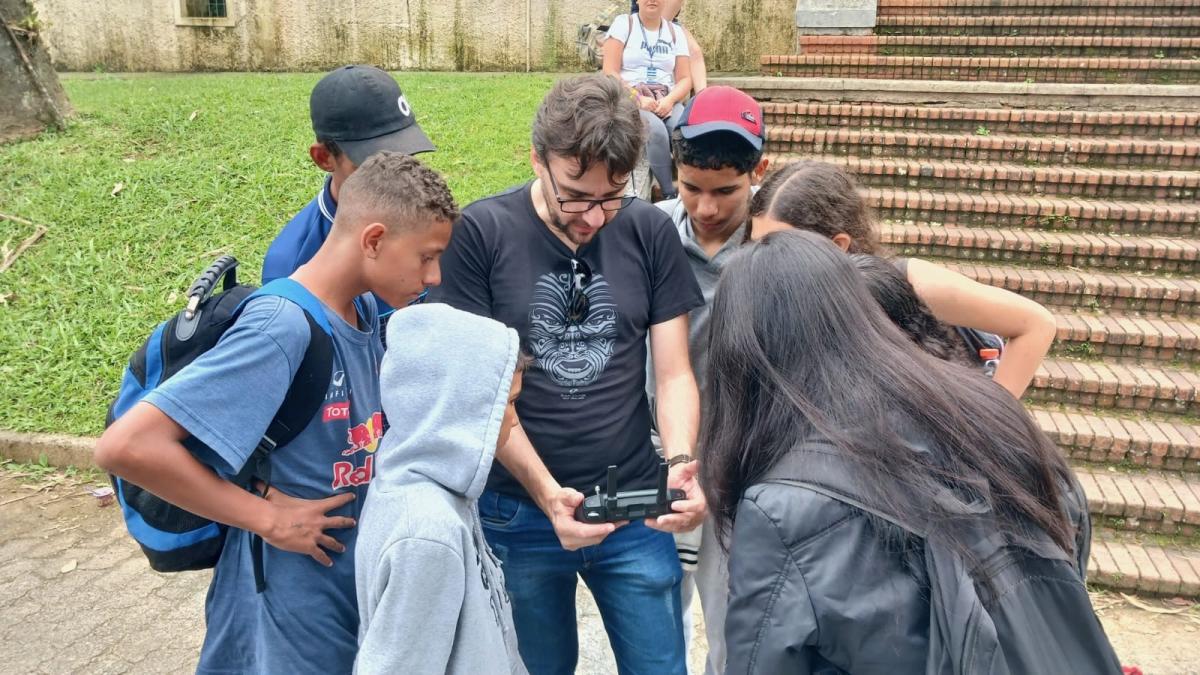
Invest in Local Experts, Cultivate Lasting Change
July 18th, 2025

In 2024, Brazil Flying Labs undertook its first project as part of WeRobotics’ Turning Data into Action (TDIA) programme. Partnering with Fundação Florestal and the Federal University of ABC in São Paulo, the team initiated Fight for the Forest, a data-driven project to map and assess the conservation status of the Águas da Billings State Park. The park was created to protect the Billings Reservoir, a lifeline for São Paulo, and to shelter a remnant of the once-vast Atlantic Forest—an ecosystem that now survives in fragments, threatened by bulldozers and smoke.
When the project began, Brazil Flying Labs had only just joined the Flying Labs Network. This opportunity provided a jumpstart. The purpose of the TDIA program is to give Flying Labs a methodology with a toolbox that puts stakeholders at the heart of drone data projects. To this end, microgrants are part of the program to give Flying Labs a chance to get acquainted with the methodology and experience first-hand the outcomes when the focus is on people, not technology. This way, the program offers a learning opportunity for Flying Labs based on a small project they are passionate about and would like to implement as a proof of concept.
Thus Brazil Flying Labs learned by doing and led by listening. They walked the ground with partners, spoke with communities, and began to see that they were not alone. There were many others around them, trying in their own ways to use technology for good. They began connecting, nurturing partnerships.
We realized that there are people out there doing things similar to what we do, and they’re doing amazing work, helping people. It’s like a door opened, and suddenly we discovered that many people in Brazil are doing great things.
— Diego Ferruzzo Correa, Coordinator, Brazil Flying Labs
One of the most valuable relationships to emerge from this project was with Fundação Florestal. Despite the organisation’s continued efforts, the Atlantic Forest still faces intense pressure from urban sprawl, agriculture, illegal logging, and climate change. Battered as it is, the forest continues to resist. But it will not survive through isolated efforts. To safeguard what remains requires collaboration. Brazil Flying Labs is now working closely with Fundação Florestal to address these challenges from multiple angles: research, technology, community engagement.

And stakeholder engagement (including community engagement) is the core of the TDIA program. It emphasizes deep collaboration with local authorities and communities from the outset, ensuring that solutions are not imposed from the outside but co-created with those who know their needs best. The purpose of this work is to create ownership among stakeholders in local communities and enable them to utilize these technologies to solve their challenges, be it in climate action, disaster response, food security, or health. In truth, the TDIA microgrants aren’t about data or technology; they are about people. They are about the idea that local knowledge matters and that local voices deserve to be heard not in translation, but in their full, original power.
It’s extremely important to listen carefully to stakeholders—to understand their real needs with patience. Sometimes, we want to do something because we have the technology or the resources, but that doesn’t always align with what stakeholders need. Understanding stakeholders from the beginning makes a significant difference in the future. Taking the time to ask questions, listen, and truly grasp their main problems is essential before building a proposal.
— Diego Ferruzzo Correa, Coordinator, Brazil Flying Labs
Brazil Flying Labs embraced this approach. And the effects were evident not just among the local stakeholders but in the team itself as well. The project became a turning point, sparking growth at both individual and organizational levels. Team members began to truly see themselves as drivers of change. They took ownership of the project and, in doing so, strengthened their belief that local action matters. With heightened technical capability and a deepened sense of purpose, each member of the growing team plays a valuable role, bringing unique contributions and sharing collective responsibility for their success. Together, they are building a strong foundation for future projects. This is the true power of collaboration and sharing—core values of the Flying Labs Network that are now rooted in Brazil Flying Labs.
We started with two people, Marcelo and me. Now, we have grown to eight people, including six staff members and two collaborators. I also noticed the engagement of my students—I’m a university professor. It’s been incredible to see my students engaging with the vision of Brazil Flying Labs. Just yesterday, we attended an event where we were invited to talk about the project. I was there with my students, and they spoke about the project as if they were the main actors, which, in fact, they were. Seeing this growth and engagement has been amazing.
— Diego Ferruzzo Correa, Coordinator, Brazil Flying Labs
Struggles often lead to strength, and for Brazil Flying Labs, the challenges they faced sharpened both their technical expertise and their ability to collaborate and problem-solve together. A key partnership with a local drone company unexpectedly fell through, threatening to derail everything. But instead of losing momentum, the team turned this challenge into an opportunity. They found new allies at the Federal University of ABC, whose support brought not only critical tools but also renewed energy and expertise. What began as a setback ultimately led to a stronger team and improved resources. Later, wildfires swept through the region, and the very stakeholders they hoped to engage were busy fighting flames. Again, the team adjusted, persisted. This is what meaningful community engagement requires: not perfection, but resilience. Not speed, but staying power.
Now, I can confidently say that if I weren’t here, things would still continue and grow. Brazil Flying Labs is not dependent solely on me, and that’s incredible. We’re building an organization that does not rely on just one person.
— Diego Ferruzzo Correa, Coordinator, Brazil Flying Labs
The Fight for the Forest project laid essential groundwork for more effective decision-making, resource allocation, and environmental stewardship in Brazil — an approach that can be utilized by other protected areas looking to apply technology for conservation. It is proof that when local experts are trusted, supported, and resourced, they can create solutions that are deeply relevant and enduring. To explore this work further, check out Brazil Flying Labs’ interactive story map, and to support their mission, reach out to the team directly.

This is why WeRobotics believes so fiercely in the Power of Local. Because behind every successful project, there are local stakeholders who understand its needs and local experts who understand the geographical, cultural, and political terrain of their home. There is a quiet reminder that in a sustainable and equitable future, the solutions come from within.
Technology cannot save the world. But people can — if we let them lead.
WeRobotics works to provide local experts in Africa, Latin America, the Caribbean, and Asia/Pacific with a platform, skills, frameworks, technologies and opportunities to lead and contribute to local solutions. Reach out to connect with us or contribute to our work, and to stay up to date with our work, consider subscribing to our email newsletter.
Category(s):
Location(s):
Recent Articles

